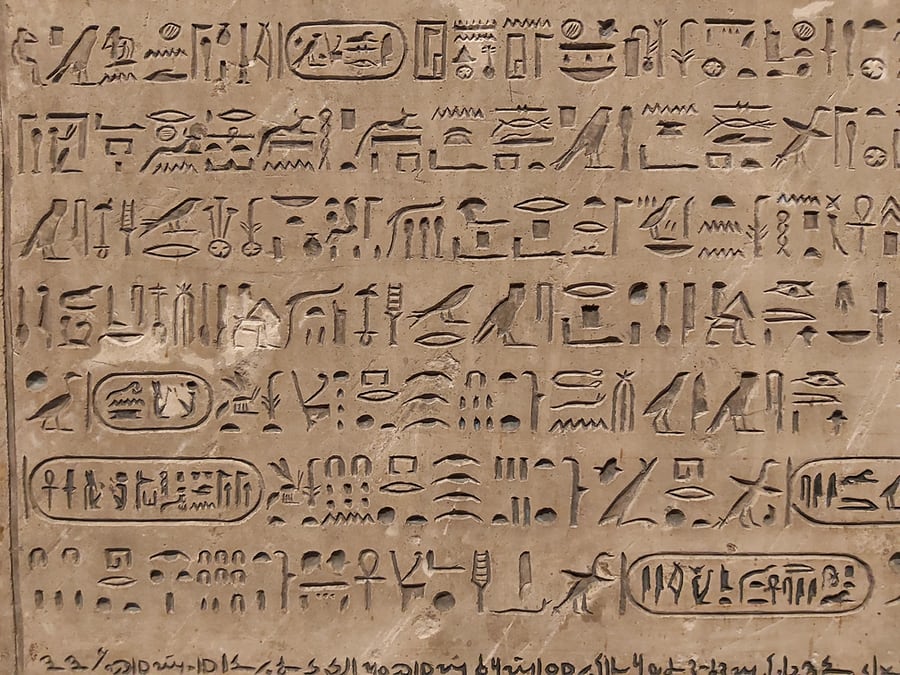Scripture: Genesis 39-41
Learning Objectives:
- Students will learn God has a plan, but sometimes bad things still happen.
- Students will learn God is always working, even when bad things happen.
- Students will learn God can use whatever happens to us (good or bad to prepare us for what He wants us to do).
- Students will learn God sometimes God will ask us to wait for the next step of His plan to happen.
- Students will learn we can serve God anywhere we are.
- Students will learn the history of Joseph’s life and learn how to use hieroglyphics.
Guiding Question: What does God want us to learn from Joseph’s life?
Materials: Photos of clothing from the time period, paper, pencil, colored pencils, copys of pages with hieroglyphics
Procedure: Introduce students to Egyptian culture in the time period when Joseph was in Egypt …the Middle Dynasty-specifically the 12th. Joseph was probably living in Egypt under the Pharaoh Sesotris. Under Sesotris, there was a Vizier named Mentuhotep who sounds a lot like Joseph in his description (Joseph would have been most likely given an Egyptian name which the Bible does not give us). Joseph was sold into slavery by his brothers. The traders to whom they sold him were most likely their distant cousins (through the children Abraham had with his wife after Sarah died).
When slaves from other countries were sold to wealthy Egyptians during this time period, they had some of the more desirable assignments for slaves. Joseph was a servant in the house of Potiphar doing such things as bringing the family food. He would also have been given the chance to learn to read and write the Egyptian language. Because God blesses Joseph in his duties Potiphar promoted him to steward. This means JOSEPH was in charge of all of the agricultural holdings of Potiphar. This experience would have proven very helpful to Joseph later when he oversaw the agriculture of the entire country during the seven years of plenty and famine.
When Joseph was sent to jail – apparently to stay for a period of time, that was extremely unusual. Egypt was one of the few countries that even had a prison and it was mainly used as a place for prisoners to wait until they received their sentence which was usually death, fines or mutilation – or found innocent and released. To stay indefinitely as it seems Joseph would have had it not been for the dreams means Potiphar probably knew Jospeph had been set up. When Joseph became primary aide to the prison warden he would have been exposed to the governmental paperwork he would later have to do on a larger scale when he was promoted by Pharaoh.
In fact, God used the years Joseph was a slave and in prison to prepare him for the crucial jobs he would do later. In the time of Joseph, Egyptian men were very concerned with cleanliness and were clean shaven They often wore makeup and at times fake beards. They wore a white wrap around skirt tied at the waist with a belt. They didn’t wear shirts. Men who were slaves wore a white kilt type skirt. Most of their clothes were made of light colored linen. Women wore simple sheath dresses that went to their ankles. Their food consisted of lamb, goat, rustic breads, onions, lettuce, dates, figs, cucumbers, melons and peas. Bring in some of the foods for students to taste. Show them photos of the clothing. Bring in linen cloth for them to touch. Note that the pyramids had already been built by the time Joseph came to Egypt. Have students practice writing and reading some simple hieroglyphics. (https://www.ducksters.com/history/ancient_egyptian_hieroglyphics.php)
Additional Questions: How can students work with hieroglyphics?
Supplemental Activity: Have students create a story in hieroglyphics to give to another student to figure out.

